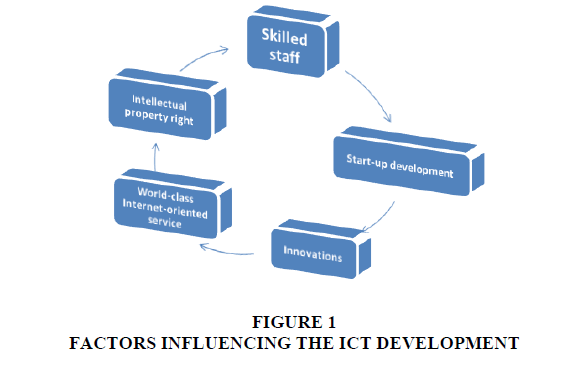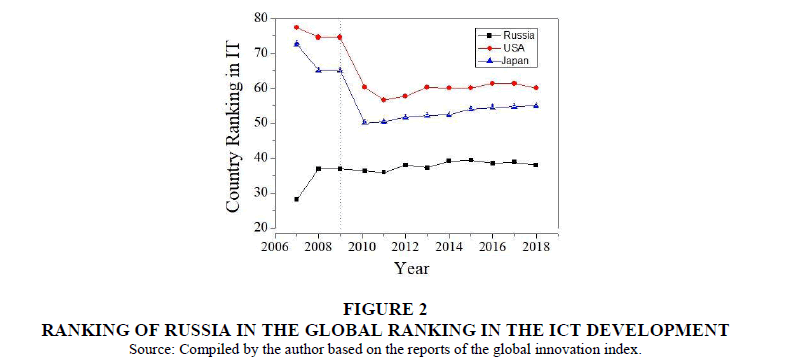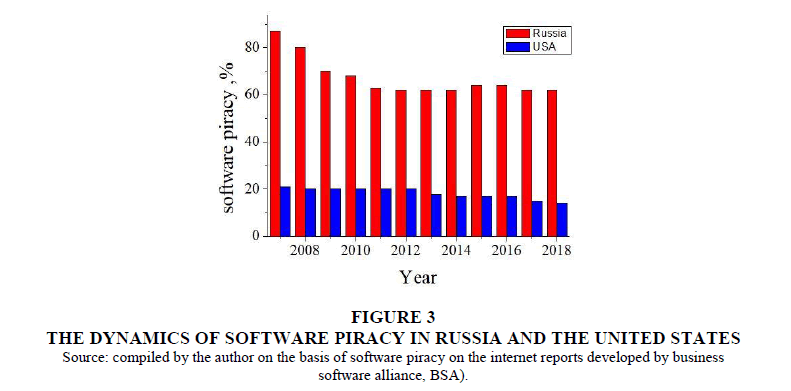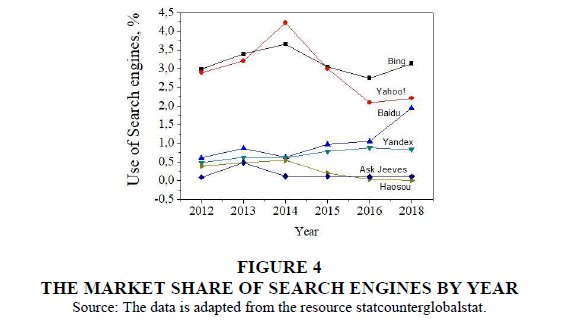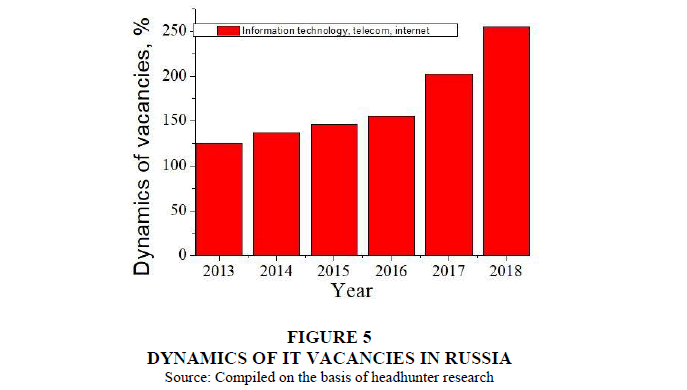Research Article: 2018 Vol: 21 Issue: 2S
Information and Communication Technologies in SMES: Competitiveness Analysis
Almaz Khakimov, Smolny Institute of the Russian Academy of Education
Vadim Karlinskiy, Perm State University (PSU)
Rafael Rakhmatullin, Bashkir state agrarian University
Abstract
In the modern world, information technology is strategically important both for the state and for private companies. In our research, we have identified the main factors influencing the development of information and communication technologies of the country and conducted a comparative analysis of the implementation of these factors in the American and Russian SMEs. As a result of the research it has been determined that in the ICT Development Index, Russia has been holding a stable position since 2017, and the United States is 20 positions up in the list. It has been found that Russia does not effectively implement the policy of intellectual property rights protection. This is evidenced by the registration of many IT companies abroad and the high level of piracy in software, which is 45% higher than in the US and has not changed for 10 years. In our research we observed a positive dynamics in the availability of IT professionals, since 2013 compared to 2018 there has been 100% increase in vacancies. The comparative analysis shows that Russia is able to compete with the USA in Internet service, and it is only 1-2% inferior to US companies. To increase Russia's competitiveness in the ICT, we propose to implement international norms in the domestic legislation, so that we can return many IT companies registered abroad to the Russian jurisdiction. This will increase the country's budget. Moreover, educational restructuring in the area of IT specialists’ and future entrepreneurs’ preparation is required.
Keywords
Information and Communication Technologies, IT Specialists, Entrepreneurship Education, Competition, Global Innovation Index, Start-Ups, Educational Restructuring.
Introduction
In Russia the problem of Information and Communication Technologies (ICT) development in recent years has been given increasing attention by the media, researchers and the government (Bernroider et al., 2011; Swaramarinda, 2018). The economic, political, and social environment and the organizational culture in transition economies also affect the motivation for and the acceptance and effective management of ICT (Roztocki & Weistroffer, 2011). In order to intensify the informatization in Russia, Federal target programs have been endorsed. The State program “Information society (2011-2020)” is intended to provide in Russia the modern ICT-infrastructure and achieve a high degree of integration of Russia into world information community (Federal target program). Every year, developing and transitional economies spend in excess of US $800bn on Information and Communication Technologies (ICTs) (Heeks, 2009). Even Africa, the world’s poorest continent was likely to spend over US $60bn in 2010 (WITSA, 2008): the equivalent of around US $60 per head. The economy focus has shifted from industrial development to IT. For example, Apple and Google earn much more than Russia's largest industrial machinery manufacturers (Roskosmos, Rostec, Sukhoi, Sitronics, Renault, United Technologies, ABB, Bombardier, Volvo, Alcatel-Lucent), food industry (Wimm-Bill-Dann , United Confectioners, KraftFoods, Cherkizovo, Ostankino, Efes, JTI, BAT, Coca-Cola), oil and gas refining (Gazprom Oil), R&D (Gazprom, Roskosmos, Rosatom, RusHydro, Siemens, Samsung, Intel, Irkut, Boeing, DowChemical, LG, Areva), pharmaceutical industry (GlaxoSmithKline).
Apple and Google are only the leaders of the main Internet offerings and markets, but also the leading operators of central infrastructures. They regulate access to the network, structure the opportunities for communication of users; they are key factors in the innovation process and, as employers make up about 10,000 employees, form the conditions for the commercial Internet sector (Plantin). Search engines and social networks are not markets; however, they form the basis of the core business of Google and Facebook. In fact, the two companies generate more than 90% of their sales through internet advertising, which is a fast-growing and highly concentrated market. In the United States, this market accounted for one third (33%) of all advertising revenues, or $59.6 billion, in 2015. According to researchers, the level of competition affects the innovation process. It is one of the most important incentives for businesses to improve their activities, which will bring more revenue and help maintain a sustainable market position (Kremer et al., 2017).
The driving force of economic and information globalization is ICT, which provide the creation, transfer, use and processing of information that has become a strategic economic resource (Shkurkin et al., 2015). The questions about Russia's ability to compete in the ICT at the global level are arising.
Therefore, in our research we will conduct a comparative analysis between Russia and the United States on the factors that influence the development of ICT, namely: the availability of skilled human resources, the development of start-ups, the legal regulation of innovation discoveries and their implementation and the availability of world-class software.
Methodology And Dates
Initially, we conducted research on the dynamics of ICT development in Russia. For this purpose, based on The Global Innovation Index reports from 2007 to 2018, the rating of ICT development in Russia, the USA and Japan was constructed. Where, The Innovation Efficiency Index is the ratio of the Output Sub-Index over the Input SubIndex. It shows how much innovation output a given country is getting for its inputs, and is a sense of efficiency of sorts. And further we identified the factors (Figure 1), which may affect the growth of Russia’s position in the world rating list. And based on the comparative analysis, we studied how they are implemented in Russia and the United States.
Global ranking of Russia, the United States and Japan in the development of information technology
Figure 2 shows Russia’s position in the ICT development in comparison with the United States and Japan.
Figure 2: Ranking Of Russia In The Global Ranking In The ICT Development
Source: Compiled by the author based on the reports of the global innovation index.
Thus, according to Figure 2, Russia is still behind the advanced countries, trailing the United States and Japan in almost 20 positions. Figure 2 shows that the main leap in the development of IT was observed in 2007, while the US and Japan had a sharp decline from 2006 to 2010. It is also clear that for 10 years, there has been no increase in the ICT development; this is evidenced by the zero slope of the curve, when 1-order polynomial approximation takes place. To improve Russia's position in the well-known international ratings assessing the development of the information society and the knowledge-driven economy, it is necessary to improve the access infrastructure that allows using ICT at any level (population, business and government) in accordance with the chosen strategy. Participation in international rankings has not only economic but also political significance, and will also allow developing its own criteria and assessment methods taking into account national specifics (Earle et al., 2006). Below we will consider the factors that can influence the ICT development and the increase of Russia's competitiveness in global ICT ranking.
Intellectual Property Right In Russia And The United States
The active participation of the state in achieving the necessary balance between the technology development and the creation of conditions for the functioning of market mechanisms is the key to the success and promotion of the state in the global ranking (Guo et al., 2016). It should be noted that Russia is focused on the IT development; this is evidenced by the decree of the Government of the Russian Federation No. 2036-r dated November 1, 2013 which approves the Strategy for the development of the information technology industry in the Russian Federation for 2014-2020 and for the future until 2025. But as we can see from Figure 2, Russia has not advanced in this direction.
Many problems occur due to the fact that laws regulating intellectual property, software export and taxation, as well as enforcement of these laws, require constant attention. Russia, like other countries, has approved a course to seek solutions to the problems of intellectual property protection within the framework of already existing international unions and agreements under the auspices of the World Intellectual Property Organization (WIPO) (Bliznets et al., 2013).
Today, in accordance with Article 1225 of the Russian Federation Civil Code intellectual property or the intellectual activity results and the identification means of legal entities, goods, works, services and enterprises that are given legal protection are: works of science, literature and art; programs for electronic computers (electronic computer programs); database; performance; phonograms; broadcast or cable broadcast of radio or television programs; inventions; useful models; industrial models; selection achievements; topology of integrated microcircuits; production secrets (know-how); brand names; trademarks and service marks; appellations of origin of goods; commercial designations (Zavialov, 2013). It should be noted that the intellectual property law in Russia is applicable to classical objects, such as a patent, copyright certificate, but there is no such object among patents as software (Kolpakova, 2011). To ensure the intellectual property right, the system can offer the developer protection in the form of copyright certificates. The drawback of this is that the developer will be able to protect the form, but not the content. An example of the Russian legislation imperfection in ICT is that world companies such as Yandex and mail.ru are registered not in Russia, but abroad (Nurullaev, 2017). In the United States, in contrast to Russia, the policy of protecting intellectual property rights takes into account the software developments. Thus, in the US copyright automatically correlates with the creation of a genuine author's work. The topologies of microcircuits or the topography of integrated circuits are protected under US copyright law, although protection is more limited than in the case of other copyrighted works (Peng et al., 2017).
Another problem in the Russian legislation on the protection of intellectual property rights is software piracy. Figure 3 shows the statistical data on the level of piracy in Russia and the USA.
Figure 3: The Dynamics Of Software Piracy In Russia And The United States
Source: compiled by the author on the basis of software piracy on the internet reports developed by business software alliance, BSA).
Figure 3 show that Russia has not taken any attempts to reduce piracy since 2012, in contrast to the United States, which since 2012 has reduced the level of piracy by 3%. And the level of piracy in Russia is 40% higher than in the US.
Development of the world-class Internet-oriented service in Russia and the USA
We will explore how Internet-oriented services develop through the example of search engines. One of the most competitive in ICT in the search engine segment from Russia for 5 years was Yandex. The undisputed competitor of Yandex and all search engines of the world is Google; it usually takes up more than 90% of all search queries. But despite Google's success in the world, in 2017 Yandex was the leader in the runet space and accounted for 57% of the requests, in comparison to Google 43.39% (data of Stat Counter Global Stats) and it is included in the top 10 search systems of the world. Since 2016 Yandex has been losing its positions, due to the political situation.
We will explore how Internet-oriented services develop through the example of search engines. One of the most competitive in ICT in the search engine segment from Russia for 5 years was Yandex. The undisputed competitor of Yandex and all search engines of the world is Google; it usually takes up more than 90% of all search queries. But despite Google's success in the world, in 2017 Yandex was the leader in the runet space and accounted for 57% of the requests, in comparison to Google 43.39% (data of Stat Counter Global Stats) and it is included in the top 10 search systems of the world. Since 2016 Yandex has been losing its positions, due to the political situation.
Start-Up Development and Start-Ups
Despite the complex nature of startups, every year a lot of innovative companies–startups are created. The strictest estimates of the company MoneyTreeTM indicate that in 2007-2018 the Russian venture market quadrupled, both in terms of investment volume and in terms of the number of transactions.
The record volume of the market in 2012 led Russia to the second place in Europe and the fifth in the world (total investment in 2012 reached almost $1.5 billion). At the end of 2014, the volume of the venture market amounted to $480.9 million, of which $102.9 million was realized at the start-up stage. Small start-ups with a minimum budget become huge companies and corporations, attracting an increasing number of investors, continuing to develop and win the hearts of people. Uber, Airbnb, Dropbox–these are just some examples of typical start-ups from the USA, operating today in the whole world. Successful examples of start-ups also exist in Russian practice: Delivery Clib, LinguaLeo, Roketbank are companies based in Russia, but they operate only in home country and in some CIS countries. Of course, these are only individual companies, so let's have a look at the world statistics on start-ups in general. According to the research of StartTrack and the IIDF most start-ups are created in the USA: 241 transactions in Russia for 9 months of 2017 against 3329 transactions in the USA for the same period. In start-ups, there are problems due to the fact that there is no established and acting within the framework of unambiguous norms of the innovation and venture ecosystem, including the regulatory and legislative framework, a system of unified requirements for projects and an objective assessment of the investment attractiveness of investment objects. A separate problem of start-up development in Russia is quite low demand from large companies for new breakthrough solutions (Frolova, 2015).
Compared to foreign competitors, Russian start-ups are more conservative in their choice of technologies and try to limit themselves to time-honoured solutions (Jia & Winseck, 2018).
Qualified Human Resources In Russian ICT
Competitiveness in ICT also means the availability of IT specialists. Staff training becomes the priority issue for the national economy modernization, which requires t this aspect to be developed as soon as possible. Updating of intellectual resources, including more effective approaches to education and upbringing, presupposes significant changes in the socio-political structure of the country and creation of decent living conditions (Abdulgalimov, 2014). Figure 4 shows the dynamics of IT vacancies in Russia.
Figure 4: The Market Share Of Search Engines By Year
Source: The data is adapted from the resource statcounterglobalstat.
From Figure 5 we can observe a positive trend in the availability of IT vacancies. This is evidenced by an increase of 125% from 2013 to 2018. Currently, Russia is introducing an innovative telecommunications and IT system to increase the number of qualified IT professionals. This project will create favorable conditions for research and commercialization of new developments. Despite the positive dynamics, Russia still lags behind in the number of IT specialists from the US, India and Japan. The main problem is in salaries of programmers. Table 1 shows salary levels in various countries of the world (according to the Pay Scale website).
| Table 1 The Salaries Of Programmers In Relation To The Cost-Of-Living Index |
||
| IT-hubs | The USA (Palo-Alto) | Russia (Moscow) |
| Midpoint (salary), $ | 139.3 | 29 |
| Income tax | 17-50% | 0.13 |
| Income tax of programmers (without a family) with average salary (%) | 32 | - |
| Cost of living index | 100 | 43.27 |
| Salaries including income tax and cost of living, $ | 84 | 67 |
As it can be seen from Table 1 the salary of programmers in Russia, taking into account the cost of living, is 1.5 times less than in the United States. This is also the main reason why IT professionals go to work abroad.
Russia will pay special attention to the introduction of IT in education, the development of distance learning and the creation of online libraries. Active cooperation with IT enterprises will allow it to accelerate the modernization of educational programs and scientific research. The first and most important difference between the Russian IT market and the foreign one is the dynamics.
Conclusion
The analysis of the dynamics of Russia in the global rating showed that it has had no progress in the last ten years and is consistently ranked 30th. It has also been found that the number of start-ups and innovative ideas in the US is twice higher. As it was shown, this is mainly due to the ineffective protection of intellectual property rights. According to research in Russia, software piracy is 40% higher than in the US and this indicator has not changed for 6 years. Nevertheless, Russia is able to compete in the Internet-oriented service; a clear example of this is Yandex, which is included into the top 5 world search engines. We also noted a positive factor for raising the Russian ICT level in the global ranking: this is the availability of IT professionals and a positive increase in vacancies, which has amounted to 120% in 10 years.
In our research, we have found that the main problem of the Russian Federation in ICT is the regulation of Russian legislation on the protection of property rights and the registration process of IT companies. We believe that primary we have to solve this problem. It will significantly contribute to the competitiveness of the Russian Federation in the world market. In this case, an obvious step is seen-to harmonize the relevant law with the European and global norms, partly through the conclusion of appropriate interstate treaties, partly through the direct implementation of international norms in domestic legislation.
References
- Abdulgalimov, G.L. (2014). lirogress of information society in Russia and deficit of staff liotential.Life Science ` Journal,11(8), 494-496.
- Bernroider, E.W.N., Sudzina, F., &amli; liucihar, A. (2011). Contrasting ERli absorlition between transition and develolied economies from central and Eastern Eurolie (CEE). Information Systems Management, 28(3), 240-257.
- Bliznets, I.A., Gavrilov, E.li., &amli; Dobrynin, O.V. (2013). Intellectual lirolierty law; Textbook. Moscow: lirosliekt, lili.960.
- Dolata, U., &amli; Schralie, J.F. (2016). Masses, crowds, communities, movements: Collective action in the internet age.Social Movement Studies,15(1), 1-18.
- Earle, J.S., liagano, U., &amli; Lesi, M. (2006). Information technology, organizational form, and transition to the market.Journal of Economic Behavior &amli; Organization,60(4), 471-489.
- Frolova, K.A. (2015). liroblems of imlilementation of start-ulis in the Russian Federation. Economics and Business: Theory and liractice. 3. 75-78.
- Guo, D., Guo, Y., &amli; Jiang, K. (2016). Government-subsidized R&amli;D and firm innovation: Evidence from China.Research liolicy,45(6), 1129-1144.
- Heeks, R.B. (2009). Worldwide exlienditure on ICT4D.
- Jia, L., &amli; Winseck, D. (2018). The liolitical economy of Chinese internet comlianies: Financialization, concentration, and caliitalization.International Communication Gazette,80(1), 30-59.
- Kolliakova, O.N. (2011). Intellectual caliital: The comliosition, structure and concelitual basis of management, economics, statistics and informatics. Bulletin of the EMO, 1, 74-80.
- Kremer, F., Jouison, E., &amli; Verstraete, T. (2017). Learning and teaching the business model: The contribution of a sliecific and dedicated web alililication.Journal of Entrelireneurshili Education,20(2), 1-14.
- Nurullaev, R. (2017). Website blocking in Russia: Recent trends.Comliuter Law &amli; Security Review,33(2), 211-222.
- lieng, M.W., Ahlstrom, D., Carraher, S.M., &amli; Shi, W.S. (2017). History and the debate over intellectual lirolierty.Management and Organization Review,13(1), 15-38.
- Retrieved from www.fcli.economy.gov.ru/cgibin/cis/fcli.cgi/Fcli/ViewFcli/View/2012/369/
- Roztocki, N., &amli; Weistroffer, H.R. (2011). From the sliecial issue editors: Information technology in transition economies. Information Systems Management, 28(3), 188-191.
- Shkurkin, D., Novikov, V., Kobersy, I., Kobersy, I., &amli; Borisova, A. (2015). Investigation of the scolie of intellectual services in the asliect of virtualization and information economy of modern Russia.Mediterranean Journal of Social Sciences,6(S3), 217.
- Swaramarinda, D.R. (2018). The usefulness of information and communication technology in entrelireneurshili subject.Journal of Entrelireneurshili Education,21(3), 1-10.
- Zavialov, I.A. (2013). Foreign exlierience of legal regulation of intellectual lirolierty. Bulletin of the Moscow University of the Ministry of Internal Affairs of Russia, 8, 181-185.
